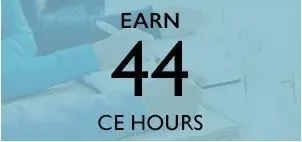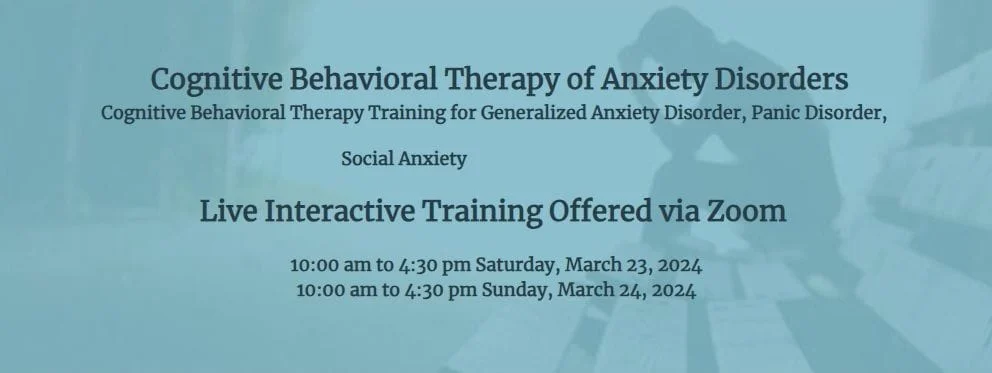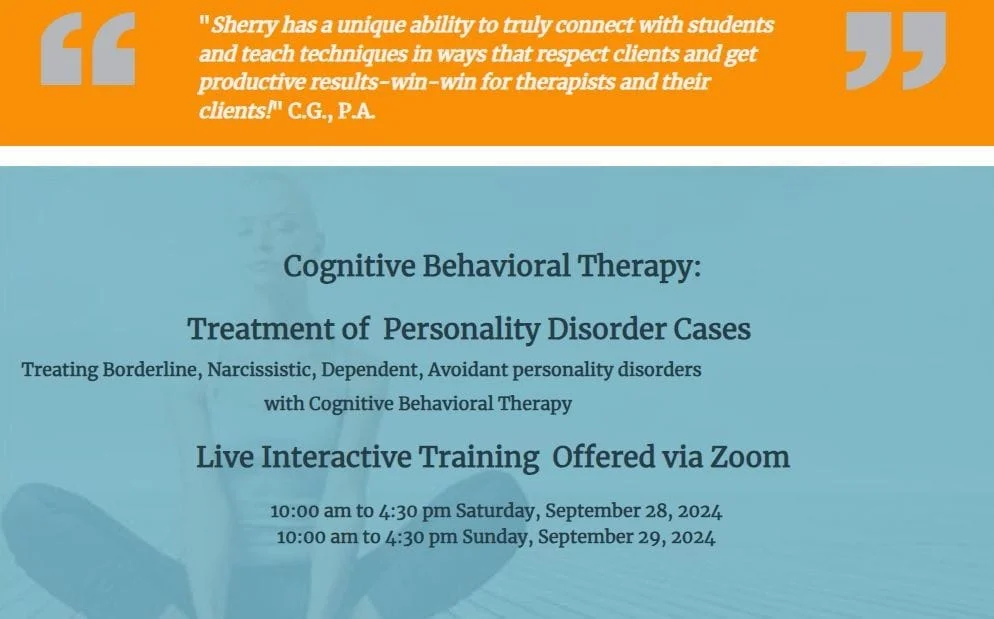
Take Steps Towards Certification in:
Cognitive Behavioral Therapy * Earn up to 44 Continuing Education Hours over four weekends *Please check website of Academy of Cognitive Therapy for all certification requirements.
Live Interactive Training Offered via Zoom!

Cognitive Behavioral Therapy for Depression
Live Interactive Training Offered via Zoom!
10:00 am to 4:30 pm Saturday, January 27, 2024
10:00 am to 4:30 pm Sunday, January 28, 2024
Key Benefits & Takeaways:
- Learn in a small group setting with your peers
- Receive lots of feedback working with your own cases using CBT
- Treat specific symptoms: rumination, hopelessness, anger, anxiety
Cognitive Behavioral Therapy is one of the most effective, well-researched models for treating depression. Therapists learn successful strategies for using CBT therapy and Mindfulness-Based skills to treat clients with depression. The workshop is lead by San Diego CBT therapist, Sherry Reasbeck, PhD.
Through instruction, recordings of expert clinicians, experiential exercises using your own cases, practice using CBT skills working with depressed clients.
Specific Educational Objectives:
- Participants will identify two elements of Socratic Questioning through instructor evaluation of training exercises
- Participants will identify one method of identifying underlying assumptions through instructor evaluation of training exercises
- Participants will identify two aspects of setting an agenda
Day One
10 a.m. to 12:30 p.m. Morning Session
- Overview of cognitive model, plus cognitive model for depression
- Three methods of planning treatment for depression
- Levels of thoughts: automatic thoughts, underlying assumptions, schema
- Techniques on reviewing the treatment plan with a client to increase collaboration, motivation
- Assessment tools
12:30 p.m. to 1:00 p.m. Lunch 1:30 p.m. to 4:30 p.m. Afternoon Session
- Setting an agenda
- Weekly activity schedules
- Motivating clients to complete assignments
- Socratic questioning
- Using automatic thought records
- Experiential exercises using your own clinical cases
Day Two
10:00 a.m. to 12:30 p.m. Morning Session
- Using Socratic questioning
- Automatic thought records
- Treating targeted symptoms such as anxiety, shame, low motivation, self-criticism
- Rumination
12:30 p.m. to 1:00 p.m. Lunch 1:30 p.m. to 4:30 p.m. Afternoon Session
- Practice techniques from Mindfulness Based Cognitive Therapy
- Practice identifying and changing underlying assumptions
- Treatment plan for depression: goals, techniques
- Relapse in depression
- Resources for helping suicidal patients
Key Benefits & Takeaways:
- Teach anxious clients 10 key tools to reduce anxiety
- Help anxious clients overcome avoidance
- Learn effective strategies on staying on task with anxious clients
- Treat clients with co-morbid diagnosis
Numerous outcome studies support cognitive behavioral therapy's efficacy with anxiety disorders. In this comprehensive CBT training workshop for Anxiety Disorders, receive 12 CE units while enhancing your ability to treat your patients successfully using cognitive behavioral therapy and Mindfulness-based techniques.
Through instruction, recordings of expert clinicians, experiential exercises using your own cases, practice using CBT skills working with anxious clients.
Specific Educational Objectives:
- Participants will identify a treatment plan for generalized anxiety disorder
- Participants will identify a treatment plan for panic disorder
- Participants will be able to demonstrate using at least one technique for treating social anxiety
Day One
10:00 a.m. to 12:30 p.m. Morning Session
- Common elements of anxiety disorders
- Treatment of anxiety disorders
- Mindfulness Techniques
- Problem solving coping skills
Generalized Anxiety Disorder
- Assessment tools
12:30 p.m. to 1:00 p.m. Lunch 1:00 p.m. to 4:30 p.m. Afternoon Session
Generalized Anxiety Disorder
- Treatment Plans
- Practices on managing anxiety: Education and coping techniques
- Two methods to handle worry
- Techniques on modifying images
- Mindfulness exercises
- Using automatic thought records with anxious clients
- Assignments: strategies to increase compliance
- Experiential exercises using your clinical cases
Day Two
10:00 a.m. to 12:30 p.m. Morning Session
Panic Disorder
- Assessment for Panic Disorder
- Panic Disorder Interview
- Reviewing the Panic Scenario
- Inducing Panic Attacks
- Treatment Plan for Panic Disorders: Session by session overview of objectives, methods
- Assignments for patients with panic disorder
- Experiential exercises using your clinical cases
12:30 p.m. to 1:00 p.m. Lunch 1:00 p.m. to 4:30 p.m. Afternoon Session Social Anxiety
- Social anxiety: overview
- Education about social anxiety
- Assessment for social anxiety
- Beliefs about social anxiety: Automatic thoughts, underlying assumptions, core beliefs
- Behaviors with social anxiety: avoidance, safety modes that clients use
- Treatment plan for social anxiety
- Methods to use when client has social anxiety
- Imaginal exposure, in vivo exposure, behavioral experiments
- Assignments for social anxiety
- Experiential exercises using your clinical cases
Key Benefits & Takeaways:
- Understand and identify what core beliefs drive the client's behavior
- Learn techniques to change a client's core beliefs
- Identify your own core beliefs that get in the way of your work
Core beliefs formed in childhood (schemas) often impede a client’s progress in therapy and play a role in maintaining chronic problems. Schema therapy is designed to bring about change for these beliefs mostly formed in childhood. Schema therapy is widely used with clients with personality disorders, as well as Axis I clients. Participants learn to plan treatment for schema change, practice schema techniques, treat noncompliance/resistance. Through instruction, CD’s of expert clinicians, experiential exercises using your own cases, practice schema change techniques.
Specific Educational Objectives:
- Identify one technique to identify negative schema
- Identify one method to set up a data log
- Identify using an emotional technique to challenge negative schema
Day One
Saturday
9:45 a.m. to 10:00 a.m. Registration 10: 00 a.m. to 2:30 p.m. ( 4 hours)
Lunch 12:00 p.m. to 12:30 p.m.
Saturday Schema Change
- Identify client’s schemas
- Typical schemas, modes, goals
- Introducing schema model
- Construct alternative schema
- Positive data logs
Day Two
Sunday 9:45 a.m. to 10:00 a.m. Registration 10:00 a.m. to 2:30 p.m. ( 4 hours)
Lunch 12:00 p.m. to 12:30 p.m.
- Behavioral Experiments: Schema change
- Therapeutic Relationship
- Imagery
- Empty Chair
- Schema diary
- Continuum
- Experiential exercises using your cases
Key Benefits & Takeaways:
- Learn effective strategies dealing with difficult clients
- Change your own reactions to borderline, narcissistic, dependent, avoidant personality disorders
- Reduce therapy interfering behaviors
Learn what works with Borderline and other personality disorder cases using Cognitive Behavioral Therapy and Mindfulness-based techniques. This practical and interactive cognitive therapy training program is loaded with clinical examples to help you work with borderline, narcissistic, dependent, avoidant clients. Through instruction, CD’s of expert clinicians, experiential exercises, practice working with your own difficult cases.
Specific Educational Objectives:
- Identify one method of decreasing a borderline patient’s therapy interfering behaviors
- Identify one treatment target in treating narcissistic personality disorder
Day One
10:00 a.m. to 12:30 p.m. Morning Session
Treatment for personality disorders in general
Borderline Personality Disorder:
- Key features of Borderline Personality Disorder
- Goals
- Therapy interfering behaviors:borderline and therapist
- Schemas
- Mode flipping: Shifting rapidly from one intense emotional state to another
- Coping techniques to manage moods, feelings
- Treatment plan: Behavioral targets
- Problem solving
12:30 p.m to 1:00 p.m. Lunch 1:00 p.m. to 4:30 p.m. Afternoon session Techniques on using therapeutic material
- Assignments
- Experiential practice using your own cases
- When to terminate
Narcissistic Personality Disorder
- Schemas, modes for Narcissistic personality disorder
- Narcissists in relationship
- Treatment goals
- Stages of Treatment
Day Two
10:00 a.m. to 12:30 p.m. Morning Session
Narcissistic Personality Disorder
- Treatment interventions
- Decrease grandiosity
- Decrease hypersensitivity to evaluation
- Develop empathy
- Decrease patient’s negative behaviors
- Guidelines for therapists/ client interactions
- Problems in treatment
- Assignments
- Experiential exercises using your own cases
12:30 p.m. to 1:00 p.m. Lunch 1:00 p.m. to 4:30 p.m. Afternoon Session Dependent, Avoidant For each of the above personality disorders, the following is reviewed:
- Schemas/ Modes
- Treatment goals
- Interventions
- Therapist patient relationship
- Treatment plan
- Assignments
Where: Live, Interactive Via Zoom
Training Fee
Track 1: Intensive Training Workshops $1,170 Pre-Licensed $1,030
About Sherry
Sherry Reasbeck, Ph.D. is a recognized cognitive behavior therapist and CBT training leader who has presented at conferences, conducted training and consultation for mental health professionals in Cognitive Therapy for Depression, Generalized Anxiety Disorder, Post Traumatic Stress Disorder, Panic Disorder, Changing Schema or Core Beliefs, and Personality Disorders including Borderline Personality Disorder, Narcissistic, Avoidant, Dependent, Personality Disorders.
Dr. Reasbeck is a highly experienced San Diego therapist and is a Certified Affiliate with the Academy of Cognitive Therapy, an international organization certifying Cognitive Therapists. She is also a member of the San Diego Cognitive Behavioral Therapy Consortium.
Sherry Reasbeck, Ph.D. Cognitive Therapy and Training Center, Inc




